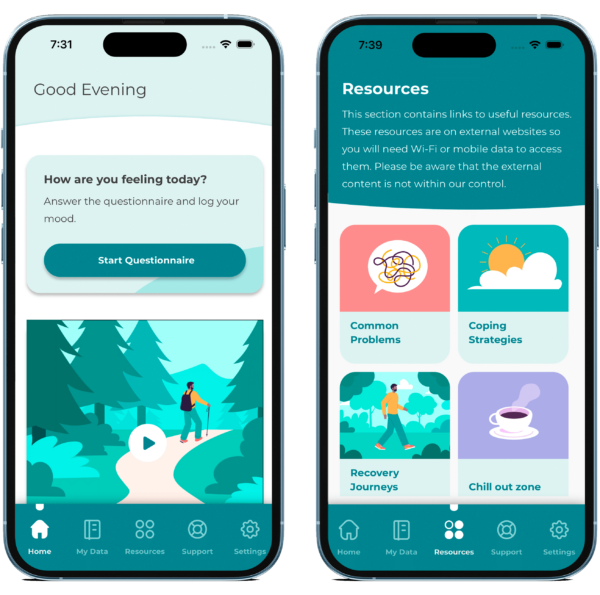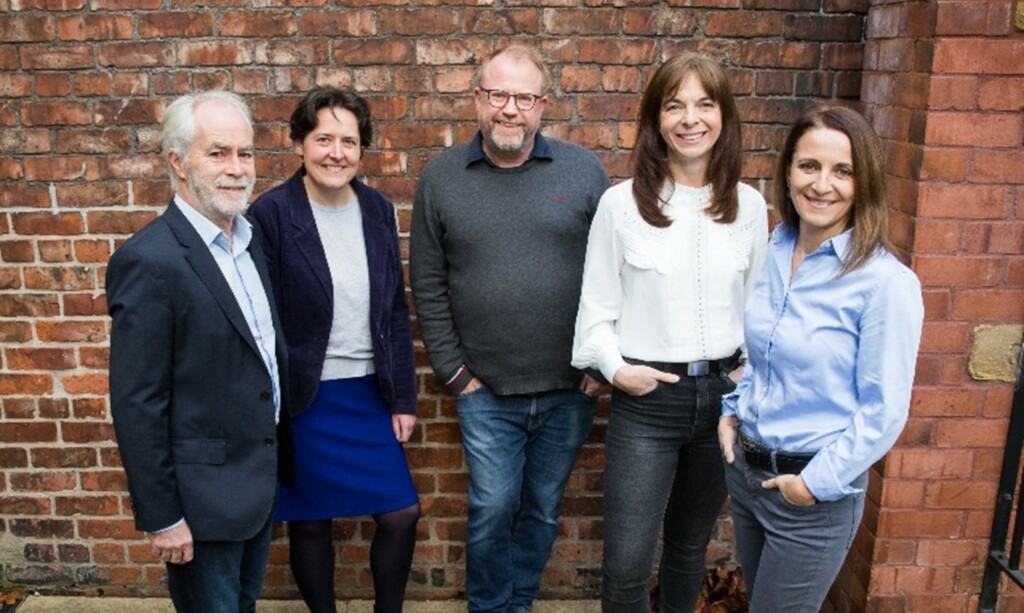Innovator Insights blog: Integrating digital innovations in mental health care – Professor Sandra Bucci
Welcome to our Innovator Insights blog series where we invite pioneering National Institute for Health and Care Research (NIHR) Manchester Biomedical Research Centre (BRC) researchers to share their personal innovation journey, how they have developed impactful research alongside industry and commercial partners and the lessons learnt along the way.
In this blog Professor Sandra Bucci shares their experience of co-founding CareLoop Health and how this broadened her perspective of integrating digital innovations in mental health to the NHS.
I joined The University of Manchester in 2007 after moving to the UK from Australia where I worked as a Clinical Psychologist in an Early Intervention for Psychosis team. Since then, my career has evolved across clinical, academic, and entrepreneurial domains. I co-lead the Digital programme of the National Institute for Health and Care Research (NIHR) Manchester Biomedical Research Centre’s (BRC) Mental Health Theme. I am an NIHR Research Professor and Professor of Clinical Psychology at The University of Manchester, and I also serve as Co-Director of the Complex Trauma and Resilience Research Unit at Greater Manchester Mental Health NHS Foundation Trust.
In recent years, I co-founded CareLoop Health, a digital mental health company that grew directly from our academic research. My work has increasingly focused on developing and evaluating innovative, evidence-based digital interventions to enhance mental health care and outcomes.

How did you start working with industry?
My journey into working with industry stemmed from a growing recognition of the limitations inherent in traditional academic research pathways. While we were able to develop promising interventions through grant-funded projects, these innovations often struggled to achieve sustained implementation in local services or broader clinical impact once the funding period ended. It became increasingly clear that relying solely on academic mechanisms was insufficient to translate our work into routine care.
This recognition led to the co-founding of CareLoop Health, a University of Manchester spin-out company built on our programme of digital mental health research alongside Manchester BRC researchers and staff. Establishing a spin-out offered a vehicle for translation that traditional academic pathways couldn’t provide at the time. It allowed us to secure different types of investment, build a multidisciplinary team beyond academia, and focus on product development and implementation in a way that aligns with the needs of health services. Ultimately supporting our goal of delivering evidence-based digital interventions to those most in need.
How did collaborating with industry influence your work and research?
Collaborating with industry has really influenced my professional trajectory. It has expanded my focus from solely academic research to include considerations of user engagement, real-world implementation, and the sustainability of interventions.

Working in a purely academic environment can, at times, bring a relatively narrow lens of metrics; engagement with industry required me to consider different metrics of value and to adopt a more solution-focused mindset. The establishment of CareLoop Health introduced me to areas such as product development, fundraising, and commercial strategy, all while maintaining a foundation in evidence-based research.These partnerships have facilitated the broader dissemination of our research, particularly within NHS Trusts seeking to integrate digital innovations into their service delivery.
These experiences have also enriched my professional network and provided opportunities to mentor early career researchers interested in translational science and innovation.
Overcoming the challenges in bridging academia and industry
Navigating the cultural differences between academia and industry presented significant challenges. The two sectors often operate on different timelines, with contrasting priorities, expectations, and ways of communicating. The differing timelines and priorities required deliberate efforts to establish mutual understanding and effective communication. These differences extended beyond culture into structure and language – terminology that is commonplace in industry was unfamiliar at first and required a steep learning curve.
There were also structural challenges. Institutional processes were not always set up to support spin-out activity and there were few visible role models who had successfully commercialised mental health-based tools or interventions.
Much of what I learned came through doing and from the support of colleagues – by embracing trial and error, adapting quickly, and stepping outside my academic comfort zone. There was no clear roadmap for commercialising mental health-based research, and the transition demanded a new set of skills. Together with my co-founders, we recognised early on that success would require building a team with complementary expertise. We worked collaboratively to identify our gaps and brought in the right people, particularly those with experience in business development and commercial strategy.
This strengthened the vision, values and strategic direction of CareLoop Health and deepened my appreciation for interdisciplinary collaboration. Innovation is not the product of a single individual or discipline – it emerges when diverse perspectives align around a common goal.

The CareLoop Health Senior Team
Step outside your academic comfort zone
If you’re thinking about working with industry or commercialising your research, one of the most important things is to step outside your academic comfort zone. You’ll need to get familiar with areas you might not have encountered before – like business development, intellectual property, digital product design, and regulatory requirements. Understanding how commercial organisations work is essential, because it helps you think differently about how your work can have impact in the real world. You also quickly realise you can’t do it all on your own. One of the best decisions we made was to bring in people with the right expertise who could help move us forward.
Engage early and think about the end goal
Looking back, I wish I’d started thinking about translation and industry engagement earlier in the research process. Building that into your planning from the beginning can save time and create a clearer pathway to impact. I’d also recommend taking advantage of any training opportunities around innovation or entrepreneurship. They can be incredibly helpful in demystifying the commercial world and giving you the tools and confidence to take the next steps.
Getting involved in innovation doesn’t mean letting go of scientific rigour—in fact, it’s quite the opposite. It means applying that same rigour in new and often more complex real-world settings. Co-founding a spin-out has really broadened how I think about the research process. While generating robust evidence remains fundamental, the focus must also extend to how that evidence is implemented, sustained, and scaled in real-world settings.
Establishing a spin-out also highlighted the need to strengthen the connections between academia, policy, and practice to ensure research can lead to meaningful and lasting change. If we want research to inform service transformation at scale, especially in areas like mental health, then we need better pathways to implementation – and that means embracing innovation, commercialisation, and cross-sector collaboration as essential parts of the research ecosystem.
In conclusion…
Looking ahead, I am focused on expanding the reach of CareLoop Health, strengthening partnerships with NHS Trusts, and continuing to support and mentor clinician-researchers interested in exploring commercial pathways. For those considering this route, it is important to recognise that while the journey can be challenging, it also offers a rich array of opportunities for growth, for innovation, and for achieving meaningful and lasting impact beyond academia.
For more information or to discuss collaboration opportunities, please complete the NIHR Manchester BRC Industry Enquiry Form or get in touch with the BRC Innovation and Partnerships team by emailing brc-crfpartnerships@mft.nhs.uk .
Read more blogs in our Innovator Insights series.
Follow Manchester BRC on X/Twitter and LinkedIn to keep updated with the series.
